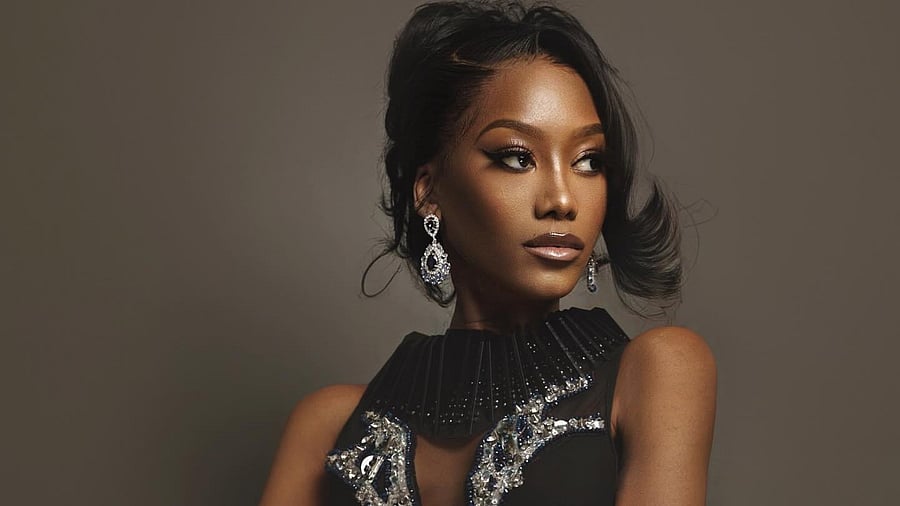
Singer and songwriter Muni Long
Credit: Facebook/MuniLong
By Jewel Wicker
For the past two weeks, scrolling TikTok has felt like an endless loop of one song in particular. Just as Muni Long’s R&B ballad Made For You breached the top 50 of the Billboard Hot 100 chart, my algorithm was offering video after video featuring the song’s chorus. Twin, where have you been? Nobody knows me like you do. Nobody gon’ love me quite like you, the singer/songwriter asserts to her lover in the lyrics. Best friends, co-workers and actual twins have used the sound, with the camera often moving rapidly between two people to convey the urgency and longing of Muni Long’s vocal delivery.
After Universal Music Group — the largest global music company — declined to renew its licensing deal with TikTok by the Jan. 31 deadline, those videos suddenly stopped appearing on my timeline, and a search for them yielded limited results. Posts that still include the song on the app prevent users from clicking on the sound to discover more content with a message that notes “the sound isn’t available in your country or region.”
In a public back-and-forth, UMG accused TikTok of wanting to compensate artists and songwriters “at a rate that is a fraction of the rate that similarly situated major social platforms pay,” and TikTok accused the music corporation of “[putting] their own greed above the interests of their artists and songwriters.”
Whoever deserves more blame in the contract dispute, the biggest loser is clear.
A lot of attention has been paid to the catalogs of big artists — such as Taylor Swift, Drake, Ariana Grande, Adele and Elton John — being removed. But it’s musicians like Muni Long, who, with a less robust fanbase and a lot to gain from viral moments, will suffer the most.
Whereas Taylor Swift has amassed an audience who eagerly awaits her every release, smaller artists must convince audiences to listen with each new song. In recent years, many musicians have found themselves relying on the hope that a calculated or unintentional TikTok trend will catapult their songs into mainstream consciousness when other promotional efforts have grown stagnant or their labels have failed to fund other marketing initiatives.
Take UMG rapper JID. He was already a successful artist with an avid fanbase, Grammy nominations and a Top 5 collaboration with Imagine Dragons on the Billboard Hot 100 before fans started taping their phones to ceilings and dancing to his single “Surround Sound” nearly two years after its original release. The Surround Sound Challenge on TikTok helped push the song to No. 40 on the chart. “These platforms are all just marketing tools built to help gain awareness,” JID’s manager Barry Hefner wrote on X, formerly Twitter, earlier this week. “TikTok [helped] the awareness of our record that was already platinum to our core audience [and] turn it into a global trend.”
Hefner said the music business remains behind the tech industry when it comes to innovation and told the Atlanta Journal-Constitution he worries about artists who are using the app to grow their audience. “Is it the app’s job to prioritize the emerging acts or is it the label who signs them, that is developing them,” he asked rhetorically during an interview with the newspaper.
TikTok’s cultural cachet is undeniable. Licensing deals have allowed its users to soundtrack videos of themselves dancing, cooking, cleaning and sharing niche personal stories in ways that haven’t historically been possible on other social media apps. But muting music throughout the platform will likely slowly start to erode the app’s unique appeal and chip away at its user base.
In 2022, Muni Long, who had recently rebranded after releasing music and writing hit songs for artists such as Rihanna, Ariana Grande and Mariah Carey under a different stage name, rode TikTok virality to the Top 20 of the Billboard Hot 100 with the indie release “Hrs & Hrs.” A trend on the social media platform quickly cemented her as an R&B artist to watch, landed her a record deal with Def Jam Recordings and earned her a Grammy for Best R&B Performance. TikTok didn’t make the hit; Muni Long did. But without the social media platform introducing the song to a large audience via its “For You” page, it’s likely that the record’s success wouldn’t have been nearly as explosive for her career.
Shortly after UMG announced plans to pull their catalog from the social media platform, Muni Long released a video on TikTok in which she criticized the music company. As she stands in a bedroom with her arms folded, text appears on the screen reading: “I mean, it’s not like they are refusing to support my music until I prove that it’s valuable by investing my own money and maybe, possibly lucking up on a hot TikTok trend or anything like that.”
It sarcastically captured a frustrating reality of lesser-known artists: They often don’t get funding or attention from their labels until a song really blows up on social media.
Still, even for rising artists, relying on the whims of a social media algorithm was never a sustainable form of music discovery. UMG removing its catalog will, unfortunately, affect them the most, but the potential for a few viral hits doesn’t provide enough business incentive for the company to acquiesce to a less-than-favorable agreement with the streaming platform.